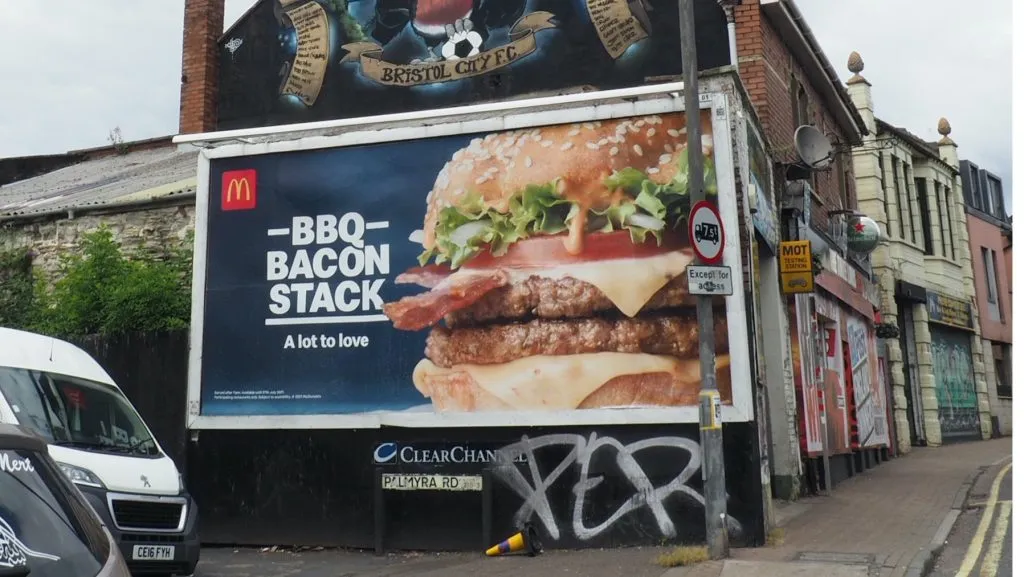
In June 2025, Bite Back’s youth-led campaign Commercial Break was scheduled to take over billboards across South London. Its message was bold:
“We’ve bought this ad space so the junk‑food giants couldn’t — young people deserve a commercial break.”
But just days before launch, outdoor advertising giants JCDecaux and Global yanked the campaign—censoring a fully approved, award-winning youth voice. And that silence speaks volumes.
What Just Happened?
Bite Back, a youth health charity, secured the Sheila McKechnie award for this audacious campaign. But despite following all advertising rules set by the CAP, JCDecaux and Global pulled the plug—claiming the message was “political”.
These two companies control around 70% of London’s digital outdoor ads, making their decisions incredibly powerful.
Farid, a 17-year-old activist, called it outright censorship:
“We broke no rules… If they didn’t think our message mattered, they wouldn’t try so hard to keep it out of sight.”
Nicki Whiteman, Bite Back’s interim CEO, added:
“When our ads are blocked and junk food ads are not, it’s clear who gets the microphone.”
The Bigger Picture: Why Junk Food Ads Matter
Research by Bite Back and the University of Liverpool reveals 57% of food adverts in major UK cities promote unhealthy, HFSS (high fat, salt, sugar) products—and this is most prevalent in deprived neighbourhoods.
Over £400 million was spent on such outdoor ads in 2024 alone.
This isn’t just advertising—it’s a relentless visual assault—spam for your appetite. Studies show young people, especially those aged 8–12, are particularly vulnerable—they often can’t spot persuasive intent and assume ads reflect what’s real and good for them .
Why This Hits Young People Hard
- Health Impact
Junk-food adverts are one reason part of the obesity crisis—child obesity rates are climbing, with direct links to type 2 diabetes and mental health struggles. - Censored Youth Voices
When youth-led health advocacy is silenced—but junk food brands stay loud—young people feel ignored and unheard. Their lived experiences don’t count. - Widening Inequality
HFSS ad saturation is worst in lower-income areas—meaning those already vulnerable see the most junk. That’s not an accident—it’s targeting.
Regulation Is Lagging
The UK government pledged to ban junk-food ads aimed at kids from TV, online, and out-of-home spaces by October 2025, later delayed to January 2026 due to food-industry lobbying. Brand-only ads also found loopholes. Critics warn the ban won’t stop until outdoor ads like these are also included.
The BMJ reports that local councils trying to ban HFSS ads face pressure from advertisers who warn of losing up to 30% of ad revenue. That’s serious leverage.
Why Young Opinions Matter
The Bite Back campaign wasn’t just a billboard—it symbolized youth voices demanding to be taken seriously. Farid and his peers weren’t saying, “Don’t advertise”—they were saying, “Let us decide what fills our streets.”
Nikita Sinclair from Impact on Urban Health said seeing youth voices silenced by advertising firms is a “stark reminder of the powerful forces we’re up against”.
Local health directors—like Peter Roderick in York and Greg Fell of ADPH—emphasised youth-led health campaigns mustn’t be censored. These campaigns are backed by science, public support, and heartfelt urgency.
Where Does This Leave the Youth?
1. Cynicism vs. Awe
- Cynics will say “this proves Big Food runs the show.”
- But others will see courage: young people speaking truth to power—and winning awards while doing it.
2. Momentum for Change
- More stakeholders are rallying: DASH Water, local mayors, public health experts—everyone’s noticing and responding.
3. Policy Pressure
- The delay to 2026 feels like compromise. Youth are demanding more: a ban that includes outdoor spaces, immediate action, not delays.
What Young People Can Do
- Join the conversation. Share or remix the campaign on social media; tag your local councillors and MP.
- Support youth voices. Sign petitions, share articles, speak up in school/local youth groups.
- Walk the walk. Choose healthier snacks, support local businesses with responsible ads, shift the narrative.
Final Word: Tune Out the Junk
The block of Commercial Break wasn’t just ad censorship—it’s emblematic of a broken system. Young people are being drowned out, but their spark of resilience is louder than ever.
Farid and the team at Bite Back didn’t just buy ad space—they bought visibility, pushed for health equity, and forced a conversation. When they’re silenced, we’re all silenced.
The message is clear: stop treating youth like consumers—start treating them like citizens.
So here’s to tuning out the junk. Here’s to empowered youth, louder than any billboard can ever be.
Because the future of our health—and theirs—depends on it.
https://insidesuccessmagazine.com/category/politics
Zita Salum, a British, Tanzanian journalist with a London heart, is making waves in the world of media. Born and Raised in Hackney London, she discovered her passion for storytelling at a young age. Her journey began as an admin for the Inside Success magazine, but her talent quickly shone through. Zita's ability to craft compelling narratives and her knack for capturing the essence of a story led her to become an editor for the magazine.
From there, her career soared. Zita has contributed to a diverse range of publications, including the prestigious W magazine, showcasing her versatility as a writer. Her expertise spans across industries such as music, corporate, political, sports, arts, and fashion. Beyond her written work, Zita has also excelled in broadcast journalism. Her natural ability to connect with interviewees and her engaging hosting style have made her a sought-after talent in the industry.
In her free time, Zita is a dedicated networker, attending industry events and immersing herself in the latest trends. She is also passionate about investigative journalism and has produced creative documentaries that shed light on important issues. With her talent, drive, and unwavering commitment to her craft, Zita Salum is undoubtedly a rising star in the world of journalism.



Leave a Reply
You must be logged in to post a comment.